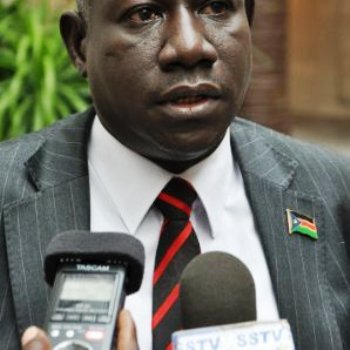S. Sudan envoy warns against sanctions, arms embargo
May 24, 2015 (JUBA) – Threats of sanctions and an arms embargo on South Sudan, will harden positions, act as a disincentive for peace and make achieving a lasting peace and justice more difficult, Baak Wol, a South Sudanese diplomat has warned.

He said government strongly believes that ending the war and the humanitarian crisis should be the first priority and expect the international community and concerned individuals to support the Intergovernmental Authority on Development (IGAD) peace initiative and encourage the parties to return to peace talks sooner.
“What South Sudan needs now is encouragement and support towards peace, not punishment and exclusion,” said Wol.
The East African regional bloc has proposed an IGAD-Plus arrangement involving the troika countries, United Nations, African Union and four African countries in the next round of South Sudan talks.
Some South Sudanese leaders proposed that the Troika nations remain as observers, amid claims they are pushing for sanctions against those obstructing the peace process.
“The government is eager to reach a peaceful settlement to the conflict with the rebels, however, it believes that a rushed or externally imposed peace as proposed in the current IGAD-Plus work plan will not last in South Sudan, and will only be a recipe for another armed conflict,” ambassador Wol warned on Sunday.
The South Sudanese envoy to Washington said the international community should encourage the mediators not to repeat the mistake they did last time, when they imposed on the warring parties a deadline of 5th March 2015 for signing a peace agreement, when they knew very well the parties have not reconciled their differences.
“Imposed solutions not agreed by the parties themselves, and negotiating under threats of deadlines are definitely the wrong way to go in South Sudan,” Wol warned.
“The government is working with members of the international community to restore peace, but equally expects to be treated fairly as the duly elected government. There should be no equivalence between an armed rebellion vent on resting political power through the barrel of the gun, and an elected government”, added the ambassador.
RENEWED CLASHES
Tension, has in recent weeks, flared between government forces and the armed opposition factions in South Sudan’s Unity and Upper Nile state, attracting widespread condemnation from regional and international bodies, including the United Nations (UN).
Thousands of civilians, the United Nations said, have been displaced into its protection of civilians’ sites in the oil-producing Unity and Upper Nile state capitals.
However, Wol said government has a constitutional mandate to preserve the sovereignty and territorial integrity of South Sudan, including unquestionable right to self-defense and protection of civilians in the face of continued rebel’s provocation and aggression.
“If the international community wants to have a role to play in bring peace to South Sudan, they should start with respecting the elected leadership and the government of South Sudan,” he stressed.
He said the international community must reflect on its current soft glove approach towards the rebels, and start to exert more pressure on the rebels to motivate them to return to the peace talks and sign a peace agreement with the government.
“Unless this is done, the rebels will maintain their unreasonable demands, and the government will continue to resist, and the innocent people of South Sudan will continue to suffer,” said Wol.
“As the saying goes, in the absence of agreed peace, violence will prevail. Yes, peace must be restored to South Sudan, but peace is a process – not an event, and again, it must take two to tango,” he added.
(ST)
